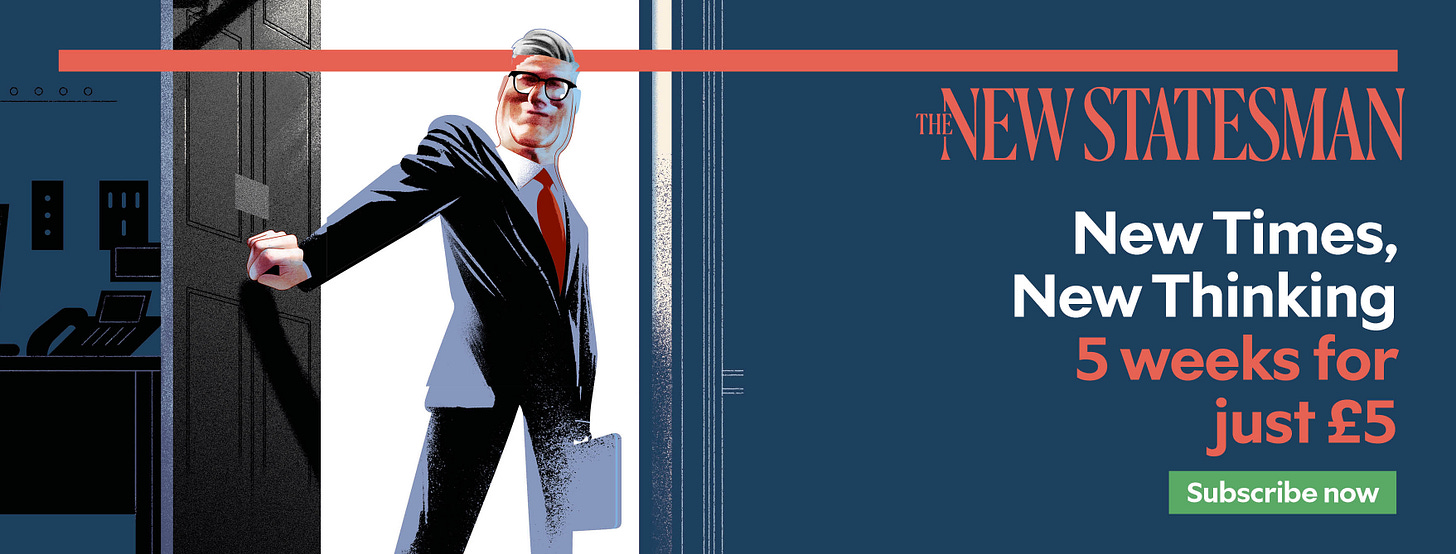Morning Call: Trump has left Starmer stranded
The Prime Minister is unable to offer either outright support or criticism of the US’s strikes on Iran.
Good morning, it’s George here. The domestic political consequences of the US’s strikes on Iran could be profound. Below I explore Keir Starmer’s precarious position.
Reports of Donald Trump’s isolationism have been greatly exaggerated. On Thursday night, one Labour MP, Jon Pearce, went as far as to call Trump “a pacifist”. But while the US president has assumed many guises during his political career, that has never been one of them.
Trump’s first term saw the US twice launch strikes on Syria, assassinate Iran’s General Qasem Soleimani, and drop the “mother of all bombs” on Islamic State in Afghanistan. Aggressive unilateralism, rather than pure isolationism, has been the hallmark of his foreign policy. The attempted destruction of Iran’s nuclear facilities this weekend marks an intensification rather than an abandonment of this approach.
For Keir Starmer, Trump’s actions have been politically exposing. “There is nothing the president said that suggests he’s about to get involved in this conflict,” Starmer told journalists at last week’s G7 summit in Canada. As late as Friday evening, after Trump declared that he would decide whether to bomb Iran “within the next two weeks”, government sources were confident that diplomacy could prevail. David Lammy, along with his French and German counterparts, met the Iranian foreign minister, Abbas Araghchi, in an attempt to persuade the country to seek a negotiated settlement with the US.
Trump’s decision to intervene – with the UK notified only shortly before – left Starmer stranded in the middle. Britain, as cabinet ministers were swift to make clear, did not participate in the strikes. Trump made no request to use the joint US-UK airbase in Diego Garcia, a demand that some believe would have left the government in danger of breaching international law (Starmer, let’s recall, explicitly opposed the 2003 Iraq War on legal grounds).
But though it’s not a participant, Britain has been far from a critic. “Iran can never be allowed to develop a nuclear weapon, and the US has taken action to alleviate that threat,” stated Starmer. This matter-of-fact declaration has seen him outflanked from the left and the right.
Kemi Badenoch, who is close to historian Niall Ferguson (a polemical champion of US intervention), declared that “by targeting Iran’s nuclear sites, the US has taken decisive action against a regime that fuels global terror and directly threatens the UK”. Nigel Farage offered a more cautious endorsement: “Reform UK stands behind the military actions of the USA overnight.” The Greens and Labour left MPs, meanwhile, have condemned the intervention as a breach of international law.
The government, by contrast, remains in the realm of ambiguity. A Foreign Office source denies Iranian claims that Lammy “expressed regret” over the US strikes during a phone call yesterday with his Iranian counterpart, describing this as an “inaccurate” account.
But the most telling exchange came last night between Starmer and Trump. “They discussed the actions taken by the United States last night to reduce the threat and agreed that Iran must never be allowed to develop a nuclear weapon,” a Downing Street spokesperson said.
Once again, it is the neutral, passive tone that stands out. Even at a greater distance from events, Starmer declined the opportunity to offer a positive endorsement of the US intervention.
The Prime Minister has every reason to strive for “de-escalation” in the Middle East. Public opinion is firmly against British intervention, the domestic terror threat is rising, and Iran’s parliamentary vote to close the Strait of Hormuz – through which 20 per cent of the world’s oil passes – could unleash new economic turmoil.
As such, Starmer is walking a precarious tightrope, eschewing both outright support and criticism of the US. But as Trump raises the spectre of “regime change” – the very opposite of de-escalation – can Starmer keep his balance?
From our partners
We can pretend that ticket price caps will solve the problems people face. Or we can build on a secure, regulated resale ecosystem. Restricting ticket resale empowers fraudsters, argues Nicola Harding, CEO of We Fight Fraud.
George’s picks
Freddie on how Benjamin Netanyahu beat America First.
Lee Siegel explores how Trump has replaced “humanitarian intervention” with the grand strategy of a businessman.
Katie warns that Trump is pursuing a war with no clear endgame.
Abbas Milani asks whether Ayatollah Ali Khamenei can survive internal and external revolt.
Ben on why the British public wants no part in Israel and America’s war.
Mailshot
BBC: Met chief “shocked” by planned Palestine Action protest
Roger Boyes: Iran has the most to risk if it fights the world
Nesrine Malik: Diplomacy won’t stop this war
William Davies: Faragist TikTok
Chris Nashawaty: Jaws still rocks
And with that…
Let me know what you think about today’s Morning Call by hitting reply. My thanks to Barney Horner and George Monaghan. Have a good day, Rachel will be with you tomorrow.
George — @georgeeaton









I think George underestimates Keir's importance to the US war machine. If someone needs a coffee, or some papers need clearing up, or maybe tickets buying for LesMis, Keir's the first person they call.
They just leave him out of the adult stuff, whilst MI6 and the CIA help with Kahanist Israel's insane anti-muslim crusade across the MENA.
The photo taken at the G7 of the PM bending to pick up Trump’s papers will go down in history as symbolic of Starmer’s legacy — a doormat of a leader, beholden to the whims of a mad tyrant.
Starmer has already tarnished many of his human rights principles, the foundation on which his life’s work seems to have been built. Were he to go so far as to walk back his belief on the invasion of Iraq and throw his full support at the war in Iran, unfortunately, I can’t say I’d be surprised.
I find this iteration of the Labour Party not only directionless but unprincipled. Perhaps its apathy and resultant cruelty has arisen from Starmer’s apparently pure intention to run government as a public service, putting pragmatism over politics. In being led astray by cosplaying the far right and making ‘tough choices’ to the detriment of our impoverished population rather than the very wealthy, that pragmatic approach has failed. This apathy may lead them to become the second Labour government in a row to launch an unjustifiable, needless, epochal war in the Middle East.
Regardless, the PM and this Labour government lost my support weeks ago. I don’t say that lightly: I am all too aware of the dire political and economic situation Britain is experiencing and how catastrophic it may become beyond the 2029 GE.